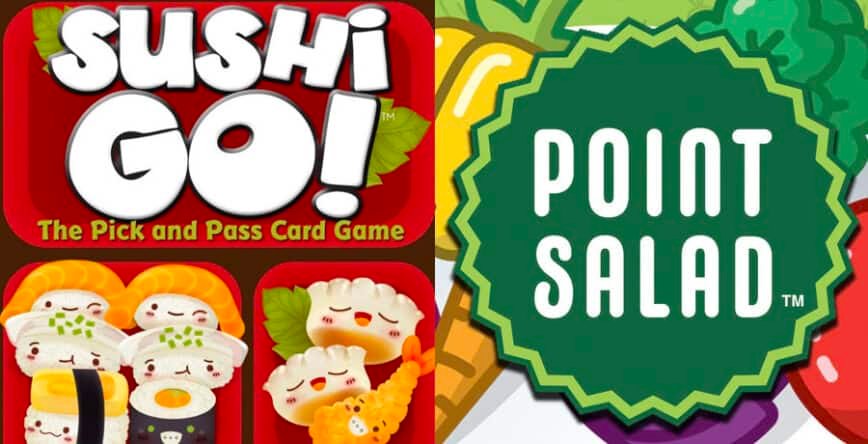In 2013, Sushi Go was released, a charming card drafting game that’s simple enough to teach in a few minutes, yet compelling enough to bring out on game night. For me, that’s made it the perfect gateway game to carry around and teach to non-gamers. But last year, a new super light drafting game came out, called Point Salad, and it’s also been getting rave reviews. Between Sushi Go vs Point Salad, which one is better? Has Sushi Go been unseated?
The best light drafting game
Drafting is perfectly suited to easy and fast games.
And for me, the two big games that fit into the light drafting niche are Sushi Go vs Point Salad. I’ll briefly review those two games, then tell you which one I prefer.
Sushi Go Review
Sushi Go is a simple game for 2-5 players. Each player will get dealt a hand full of cards, take a single card, then pass the remaining cards to the player sitting to them. Once they run out of cards, they deal a new hand, and after the third hand, the game ends.
For such a simple game, it captures a lot of what makes drafting great. You have to pay attention to what your opponent’s are doing, make choices between different kinds of cards, hedge your bets, and yell at your opponent’s who clearly took the sashimi you needed, just to spite you. The real strength is the approachability of the game. The cuteness of it. The general simplicity. While it’s not as deep as 7 Wonders, sometimes it feels like this game is the designer’s attempt at distilling away the parts that just reward rote memorization, and leaving behind most of the same strategy considerations. And honestly, yeah. It works.
I do sometimes find myself wishing it could be even simpler to teach, since I’ve taught this game to so many non-gamers. Every single type of card requires its own explanation, which inevitably someone is paying attention to, and chopsticks seems to require several explanations, and even then, someone at the table won’t get it. Obviously this isn’t a problem unless you plan to teach this game to non-gamers, and even then, it’s only barely a problem.
The game is lightning fast because each player is playing simultaneously, so everyone will be taking turns non-stop until the game ends. On one hand, this is great: players don’t get bored waiting for their turn, and the game never outstays its welcome.
On the other hand, because the entire game is played with your nose in a hand of cards, a game that is simple enough that you’d expect it to come with non-stop banter, laughing and an atmosphere of lighthearted fun, usually doesn’t. It turns out, people banter when its not their turn. This game finds a way to leave a room nearly silent as people grimly focus on an arms race consisting of smiling pudding cards.
The game is quite bad at two players. There just isn’t a lot of dynamism getting passed the same hand of cards again and again, especially once it becomes obvious what your opponent is going to take next. The counterplay just isn’t that exciting.
And the game does not stand up to a lot of repeated plays. There are only so many kinds of cards in the game, and you’ll quickly find yourself in a pattern with this game. But if you’re only interested in this game to play with family on holidays, or as a gateway to introduce someone to more complicated drafting games, it’s pretty much perfect. It wasn’t looking to be infinitely replayable.
But the designer had an answer for that problem anyways. Sushi Go Party is a more complicated version of the game that lets you customize the deck of cards each game. It sacrifices the super easy setup to give the game more replayability. Instead of just shuffling the deck, you must choose which cards will go into the deck, shuffle them together, and then sort them back out at the end. And while Sushi Go Party is most gamer’s preferred version of the game, many will find this version isn’t worth the game’s setup.
But that’s not to say it isn’t a great game. It is. This game wasn’t meant to be played to exhaustion, it was mean to be a cheap fun, easy game.
Point Salad Review
Point Salad, in many ways, feels like the successor to Sushi Go. It takes the idea of a very light drafting game, and somehow it distills it into something simpler, but with more depth.
On your turn, you will either choose to take one of the four cards on the table that scores points based on which vegetables you have, or you will choose to take two vegetable cards. Unlike Sushi Go, you’re drafting from the table, so there is more banter, more celebration when you get those carrots you really needed, and laughter when you don’t. I personally find these dynamics to be so important in a light game, and this game has it in sprouts.
Somehow, this game is even simpler to teach than Sushi Go. While every single type of card requires an explanation in that game, this game requires no scoring card explanation before beginning. I truly could not imagine a game with a simpler set of rules to explain. This game is simpler to explain than most party games even.
On your turn, you can think as much or as little as you want. You can just take cards, and be sure you’ll score some points with them.
But on the other hand, this game gives you a ton to think about. I’ve been shocked by how much depth it has. For starters, this game makes counting cards drop dead simple. Hate drafting is always an option. And the scoring card calculus feels as crunchy as any two hour euro game. No really.
And every strength of this game only gets better at two players. If you ever play at two players, and you want another strong contender, this is the winner, hands down. The added complexity of denying your opponent what they want, while making sure they can’t take what you want, is mind-boggling fun. But unlike other games, you can deny your opponent what they need in more ways than just taking it for yourself, which just multiplies the complexity.
However, if you’re not as enchanted by strategy, this game might fall short for you. Because by the end of the game, with all your different scoring cards, it might feel like you’ve made yourself a little math worksheet. Add the onion, subtract 4 points for each carrot, and 2 points per lettuce, oh, then subtract a point for each carrot. Where was I again?
It’s just a game that presents you with a lot of numbers, and some people simply struggle to stay engaged when each card might have 3 numbers on it. And honestly, they’re missing out, but they’re also not wrong.
But if you like to go deep with your games, I don’t think you will get bored. You will keep learning more and more of its depth, and find new ways to play it. You may start to ignore certain scoring conditions, taking certain vegetables before you have any cards to score for them. You will learn that going for onions when your opponent is all in on tomatoes is a bad idea. Then you will learn an opponent can’t go all in on tomatoes when you start taking onions, and that you can foil their plans.
Or maybe you won’t, and that’s fine because this game just works no matter how you want to play it.
Which is the better drafting game?
At the end of the day, aftering owning Sushi Go for 7 years, and playing the hell out of it, I don’t imagine that I’ll get it out much any more. I like Point Salad that much more. Two player gaming is my preferred way to game, and that game excels at it. It has more to think about, it’s easier to teach (and as added bonus, as a vegan of 6 years, I like that the theme is vegan). When considering Sushi Go vs Point Salad, it’s actually quite one-sided.
But I do think there are situations where Sushi Go is the right pick. Sushi Go goes much faster in 5 player groups. If you have someone who is allergic to things that start to smell mathy, they will like Sushi Go better. It’s cheaper and smaller. The Party addition brings a level of novelty that makes every game feel unique, in a way that Point Salad and Sushi Go’s original box both lack.
But as cheap and small as they both are, I don’t feel bad for owning both. But personally, for any gamer who’s asking themself which game to get, I’d recommend Point Salad.
And now for a Bonus Round:
Draftosaurus vs Sushi Go
As a bonus, I thought I’d breifly mention another game that’s not quite as popular. Draftosaurus is another light drafting game that came out last year. But instead of drafting cards, you are drafting dinosaur meeple. You are managing a zoo full of dinosaurs, represented by a player board with many different dinosaur enclosures that each score points differently. Each round you get a hand of dinosaurs, then someone rolls a dice which tells you which section of your zoo that you can place your dinosaur in that turn. Then you play your dinosaur, and pass the rest around the table.
This game has a tactility the other games on this list don’t, while not really loosing anything that the other games have.
The player boards are two sided, one with simple scoring conditions, and the other side a little more complicated. Somehow, the two sides of the board feel like different games. I would love to see this game come out with an expansion that adds like 4 more boards



Have you tried Fairy Tale?
https://boardgamegeek.com/boardgame/13823/fairy-tale
No, but that game has been on my radar for a while, I’ve just never had an opportunity to play it or buy it. It does seem like it would fit pretty well into this discussion.
I don’t think the title of your article matches the content lol. Just kidding, mainly because I had some doubts after reading the article.
Can you be more specific about the content of your article? After reading it, I still have some doubts. Hope you can help me. https://www.binance.com/fr/register?ref=T7KCZASX
Сфера недропользования — это совокупность процессов, связанный с освоением природных ресурсов.
Оно включает разведку полезных ископаемых и их промышленное освоение.
Данная сфера регулируется законодательством, направленными на безопасность работ.
Эффективное управление в недропользовании способствует экономическому росту.
оэрн официальный сайт
Thanks for sharing. I read many of your blog posts, cool, your blog is very good.
I don’t think the title of your article matches the content lol. Just kidding, mainly because I had some doubts after reading the article. https://accounts.binance.info/sv/register-person?ref=GQ1JXNRE